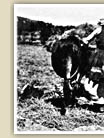
It is estimated that in this period 65 per cent of the total of the population of the country
was engaged in agriculture.
Farmers in southern and central Greece, after the distribution of
agricultural lands in the reforms of 1871, owned small
and medium-sized family properties. They produced export products
such as raisins, which gave them a considerable income. However, the international
economic crisis and the direction of state economic policies often cancelled their chances of making a profit and increasing their capital, which of course could have been utilized for the improvement of cultivation
methods. The small farmers, however, formed a social class untouched by
patron-client relationships and was thus open to social mobility
and, through it, to education.
In northern Greece, Thessaly and Macedonia, as well as in certain pockets
of Central Greece such as Euboea, Attica and Fthiotis the large estates prevailed. Farmers belonged to the sharecropping system or worked as wage labourers.
They produced chiefly grain and products destined for the local market.
In order to face the problems derived from the landed status to which they were subject, they
demanded a redistribution of land and took a leading part
in the social riots of the 1900s.
More specifically, after the annexation of Macedonia, the agricultural issue
became pressing. The influx of thousands of refugees, as a consequence of the Balkan
Wars and the First World War, and also the transformation of the northern regions of Greece
into a battlefield, caused a massive exodus of peasants towards the cities or abroad.
Animal husbandry was in a state of decline. It is estimated that the agricultural
reforms had a negative influence on this sector, as they broke up
tenure lands, causing serious problems in the grazing of flocks.
Also the opportunites offered to stock breeders to earn an additional income through seasonal agricultural
occupations was limited, as smallholders did not need extra manpower by now. Thus, a considerable
number of stock breeders opted for permanent settlement and engaged in the cultivation
of lands of low yield, substantially restricting stock breeding activities, or
forsook the countryside for good.
|
 |
